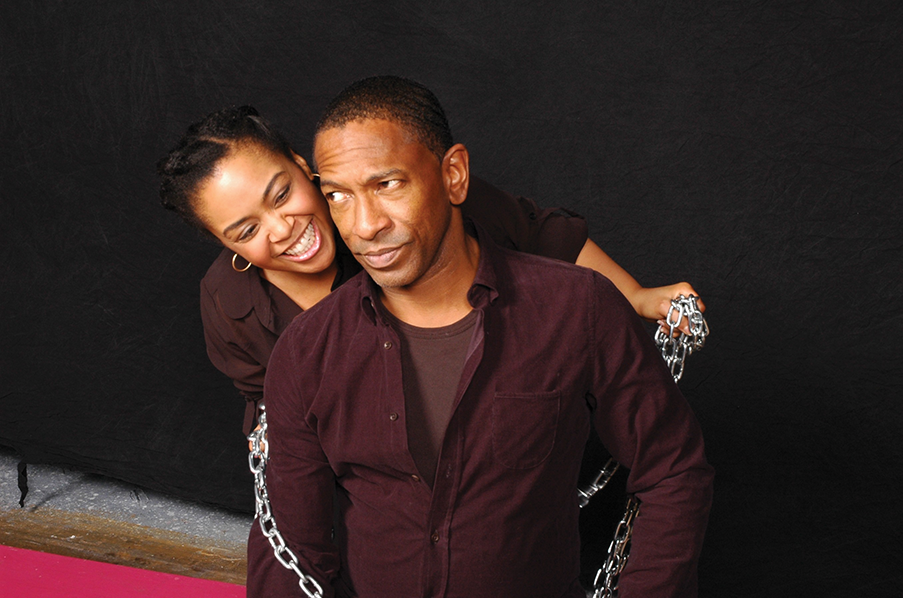
Eva St. John glowers at her boyfriend, Kevin. “Shit, women love gay men!” he laughs. “I would lie to a woman in a heartbeat to get in there!” Kevin backpedals on his joke, presses forward with his advances, slips out when he’s rebuffed, and tries several times for a sloppy kiss. “Out Loud,” an original production performed by eta Creative Arts, gives voice and form to insincerity, aggressive sexuality, and gender performativity. When Eva’s gay colleague and flatmate, Benny, arrives in time to disrupt the muddled romance, Kevin notices that he’s folding laundry, that Benny’s cooking dinner, and that—damn!—Eva’s a pimp with two men doing her chores.
“Out Loud” is a grab bag of troubling issues, aired in the daily demands of two South Side actors’ hard-knock careers. Eva and Benny perceive themselves as cultural outliers, quaffing $25 glasses of wine and munching on Garrett’s popcorn with equal ease. Rehearsing, reciting, and casting furnish the background for a discussion of self-confidence, stereotypes, and the unfairness of an oblivious world. The play leverages its acting motif to defuse the plot’s racial and political minefield, laid with viciously abusive cops looking for love, directors who want a part that’s “ghetto,” “gritty,” and “raw,” and a blond-haired disaster from Skokie who believed her black college roommate had a monkey’s tail.
Mine clearance begins as early as the play’s prologue. A hysterical black congregation erupts into absurd preaching and loud, affected alleluias. The next scene reveals that this distasteful vignette is drawn from a show in which Eva and Benny are unfortunately cast. They remove their costumes in stark spotlights onstage, each conducting upsetting, one-sided phone calls with loved ones. It frames the play with irreverence, serving as an honest and up-front omen that the upcoming characters will be just as caricatured. These are parts put on like clothing: the more garish the outfit, the more cartoonish the figure. A self-proclaimed “African Descendant” decks himself in a stridently colorful kufi and tunic; a too-good-to-be-true cardiologist wears a red blazer and blue turtleneck. Eva and Benny appear to be the play’s most sincere characters, and accordingly remain in black for its duration.
The play excels at mustering up credibly crummy figures of all walks. Its rendering of Cory—a white, jean-jacketed, and high-throated Sun-Times intern—is as a vile as Benny’s parents’ shell-shocking domestic discord. A shrill, white Obama volunteer pushing her way around Eva, Benny, and the crowd at the Grant Park acceptance speech is as distressing as the shameless black hustler pushing flags and photos onto the unaware. Yet “Out Loud” can’t sanction “fair-and-balanced” in good faith. Eva lashes out at the volunteer’s cultural appropriation, and Benny almost gets into a fistfight over the hustler’s conduct on such a momentous occasion. Both characters come from somewhere valid and pained, but neither proves to the other that they can articulate their hurt appropriately.
“Out Loud” would rather change the focus. The dredged status quo merely provides contrast for Eva and Benny—individual, activated anomalies. They’re the only stable, persistent presences within the play. The same two actors play all the other intervening characters, making these others feel transient and empty. Eva and Benny alone stand out, a dual blessing and curse. Benny struggles to rehearse the part of a heterosexual gangster. (“What are you doing?” “Scratching my nuts.”) Eva can flawlessly access the same part’s noble, fatherly love with a bittersweet irony. (“At least she know her daddy went out like a man.”) Eva laments: “I don’t think they know how to cast us.” Yet the friends each brace the other against life’s violent and silly mainstream, swimming its counterflow. Eva works through Benny’s corrosive guilt, his “what ifs.” He anxiously believes that he would have been straight, “normal,” and happy if he hadn’t been raped at age fourteen. Benny brings Eva back to reality when she spaces out watching a passing family of three. His firm presence silently asserts that she doesn’t need to worry—she’ll find love on her own terms.
But Eva and Benny feverishly argue. Eva has already twisted Benny’s messed-up past like a shiv; Benny has outright called her an egocentric bitch. Eva and Benny have just finished some heated dispute when the lights suddenly go up and a director walks onto the stage. The scene has seamlessly changed; the argument is long past. The director doesn’t believe their two characters love one another, and “Out Loud” calls cheeky attention to the fact that these archetypically life-long-friends have somewhat expectedly kissed and made up. The director returns with the next scene’s description: two protesters who find one another through teargas and the violence of this world. “Out Loud” itself fittingly proposes the same kind of active resistance against stinging attempts at cultural coercion. It reads like a commandment to play a genuine part in riding out the world’s bitter bigotries.
eta Creative Arts Foundation, 7558 S. South Chicago Ave. Through March 3. Friday, 8pm; Saturday, 3pm. $30. Student, senior, and group discounts available. etacreativearts.org

